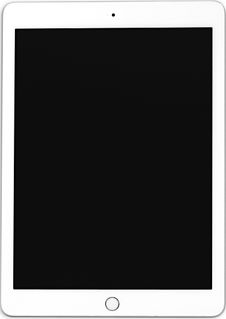 W
WiPad is a line of tablet computers designed, developed and marketed by Apple Inc., which run the iOS and iPadOS mobile operating systems. The first iPad was released on April 3, 2010; the most recent iPad models are the eighth-generation iPad, released on September 18, 2020; the fifth-generation iPad mini, released on March 18, 2019; the fourth-generation iPad Air, released on October 23, 2020; and the second-generation 11-inch (280 mm) and fourth-generation 12.9-inch (330 mm) iPad Pro, released on March 25, 2020.
 W
WThe first-generation iPad is a tablet computer designed and marketed by Apple Inc. as the first device in the iPad lineup of tablet computers. The device features an Apple A4 SoC, a 9.7" touchscreen display, and, on certain variants, the capability of accessing cellular networks. Using the iOS operating system, the iPad can play music, send and receive email and browse the web. Other functions, which include the ability to play games and access references, GPS navigation software and social network services can be enabled by downloading apps.
 W
WThe iPad 2 is a tablet designed, developed and marketed by Apple Inc. Compared to the first iPad, as the second model in the iPad line, it gained a faster dual core A5 processor, a lighter build structure, and was the first iPad to feature VGA front-facing and 720p rear-facing cameras designed for FaceTime video calling.
 W
WThe third-generation iPad is a tablet computer, developed and marketed by Apple Inc. The third device in the iPad line of tablets, it added a Retina Display, the new Apple A5X chip with a quad-core graphics processor, a 5-megapixel camera, HD 1080p video recording, voice dictation, and support for LTE networks in North America. It shipped with iOS 5, which also provides a platform for audio-visual media, including electronic books, periodicals, films, music, computer games, presentations and web browsing.
 W
WThe fourth-generation iPad is a tablet computer produced and marketed by Apple Inc. Compared to its predecessor, the third-generation iPad, the fourth-generation iPad maintained the Retina Display but featured new and upgraded components such as the Apple A6X chip and the Lightning connector, which was introduced on September 12, 2012. It shipped with iOS 6.0, which provides a platform for audio-visual media, including electronic books, periodicals, films, music, computer games, presentations and web content. Like the third-generation iPad, it has been supported by five major iOS releases, in this case iOS 6, 7, 8, 9, and 10. iOS 11, which was released on 19 September 2017, does not have support for the fourth-generation iPad because iOS 11 drops support for all 32-bit devices.
 W
WThe iPad is a 9.7-inch tablet computer designed, developed, and marketed by Apple Inc. After its announcement on March 21, 2017, conflicting naming conventions spawned a number of different names, including "seventh-generation iPad" or "iPad 2017".
 W
WThe iPad is a 9.7-inch (25 cm) tablet computer designed, developed, and marketed by Apple Inc. It was announced on March 27, 2018, during an education-focused event at Lane Tech High School in Chicago and is the successor to the 2017 model, upgraded with the Apple A10 Fusion SoC and support for styluses such as Apple Pencil. The iPad is also marketed towards educators and schools.
 W
WThe seventh-generation iPad is a tablet computer developed and marketed by Apple Inc. It features a 10.2-inch Retina display and is powered by the Apple A10 Fusion processor. It is the successor to the 9.7-inch 6th-generation iPad. The device was revealed on September 10, 2019, and released on September 25, 2019.
 W
WThe iPad Pro family is a line of iPad tablet computers designed, developed, and marketed by Apple Inc. and first available in November 2015. They run the iOS and iPadOS mobile operating systems. The current generation is available in two screen sizes, 11-inch (28 cm) and 12.9-inch (33 cm), each with four options for internal NVMe storage capacities: 128 GB, 256 GB, 512 GB, and 1 TB.
 W
WThe eighth-generation iPad is a tablet computer developed and marketed by Apple Inc. as the successor to the 7th-generation iPad. It features the same 10.2-inch Retina display as its predecessor, with the SoC upgraded to the Apple A12 Bionic processor and the new neural engine, making it 40% faster according to Apple. It was announced in September 15, 2020 at Apple's event and was released on September 18, 2020.
 W
WThe iPad Air is a tablet computer designed, developed, and marketed by Apple Inc. It was announced on October 22, 2013, and was released on November 1, 2013. Part of the iPad line of tablet computers, the iPad Air features a thinner design than its predecessors with similarities to the contemporaneous iPad Mini 2.
 W
WThe iPad Air 2 is the second-generation iPad Air tablet computer designed, developed, and marketed by Apple Inc. It was announced on October 16, 2014, alongside the iPad mini 3, both of which were released on October 22, 2014. The iPad Air 2 is thinner and faster than its predecessor, the iPad Air, and features Touch ID with the height and screen size the same as the iPad Air.
 W
WThe third-generation iPad Air is a tablet computer designed, developed, and marketed by Apple Inc. It was announced on March 18, 2019, alongside the 5th-generation iPad Mini. The device is similar appearance wise to the iPad Air 2, but features an upgraded Apple A12 Bionic chip, a slightly larger 10.5-inch Retina Display, support for Apple Pencil, Bluetooth 5.0 and faster memory (LPDDR4X).
 W
WFugue Machine is a music sequencer created by San Francisco composer and software developer Alexander Randon, also known by his stage name as Alexandernaut. Marketed as the "world’s first multi-playhead piano roll," Fugue Machine allows the user to sequence a melody and have up to three variations of it play all at the same time. The application was originally released on October 8, 2015 for iOS, and quickly garnered notability for its intuitive methods of making complex pieces and for being the first app to be developed from the "Cultural Incubator" program by the Gray Area Foundation for the Arts.
 W
WThe iCade is an accessory for the Apple iPad line of devices which functions as a miniaturised, portable arcade cabinet, including a physical joystick and buttons. The iPad is inserted into the iCade and connects to the device using Bluetooth, allowing it to be used as an arcade-style controller for compatible games.
 W
WThis is a list and comparison of devices designed and marketed by Apple Inc. that run a Unix-like operating system named iOS and iPadOS. The devices include the iPhone, the iPod Touch which, in design, is similar to the iPhone, but has no cellular radio or other cell phone hardware, and the iPad. All three devices function as digital audio and portable media players and Internet clients. The Apple TV, which runs tvOS, is a set-top box for streaming media from local sources and from certain internet services to a connected television set, and has no screen of its own. About 1.35 billion iOS devices have been sold worldwide as of March 2015. As of September 2018, about 2 billion iOS devices have been sold worldwide.
 W
WiPadOS is a mobile operating system created and developed by Apple Inc. for its iPad line of tablet computers. It is a rebranded variant of iOS, the operating system used by Apple's iPhones, renamed to reflect the diverging features of the two product lines, particularly the iPad's multitasking capabilities and support for keyboard use. It was introduced as iPadOS 13 in 2019, reflecting its status as the successor to iOS 12 for the iPad, at the company's 2019 Worldwide Developers Conference. iPadOS was released to the public on September 24, 2019. The current version is iPadOS 14.2, released on November 5, 2020.
 W
WiPadOS 13 is the first major release of the iPadOS mobile operating system developed by Apple Inc. for their iPad line of tablet computers. The successor to iOS 12 on those devices, it was announced at the company's 2019 Worldwide Developers Conference (WWDC) on June 3, 2019, as a derivation from iOS, with a greater emphasis on multitasking and tablet-centric features. It was released on September 24, 2019. It was succeeded by iPadOS 14, released on September 16, 2020.
 W
WiPadOS 14 is the second major release of the iPadOS mobile operating system since it was forked by Apple Inc. from iOS, which is used by the sister series iPhone and iPod touch. It was announced on June 22, 2020 at the company's Worldwide Developers Conference (WWDC) as the successor to iPadOS 13, with the first public beta released on July 9. It was released to the public on September 16, 2020.
 W
WThe iPad Mini is a line of mini tablet computers designed, developed, and marketed by Apple Inc. It is a sub-series of the iPad line of tablets, with a reduced screen size of 7.9 inches, in contrast to the standard 9.7 inches. The first generation iPad Mini was announced on October 23, 2012, and was released on November 2, 2012, in nearly all of Apple's markets. It features similar internal specifications to the iPad 2, including its display resolution.
 W
WThe first-generation iPad Mini is a mini tablet computer designed, developed, and marketed by Apple Inc. It was announced on October 23, 2012, as the fourth major product in the iPad line and the first of the iPad Mini line, which features a reduced screen size of 7.9 inches (20 cm), in contrast to the standard 9.7 inches (25 cm). It features similar internal specifications to the iPad 2, including its display resolution.
 W
WThe iPad Mini 2 is the second tablet computer in the iPad Mini line. It was produced by Apple Inc. It has a design almost identical to that of the first generation iPad Mini but features internal revisions such as the addition of the A7 system-on-a-chip and 2,048 × 1,536 resolution Retina Display. The iPad Mini 2 has nearly the same hardware as the iPad Air. Apple released the iPad Mini 2 in Space Gray and Silver colors on November 12, 2013.
 W
WThe iPad Mini 3 is the third-generation iPad Mini tablet computer designed, developed and marketed by Apple Inc. It was announced alongside the iPad Air 2 on October 16, 2014 and released on October 22. It uses primarily the same design and hardware as that of its predecessor, the iPad Mini 2. Its new features are the addition of the Touch ID sensor compatible with Apple Pay, differing storage sizes and being available in a gold color, as well as the previous colors.
 W
WThe iPad Mini 4 is the fourth-generation iPad Mini tablet computer designed, developed and marketed by Apple Inc. It was announced along with the iPad Pro on September 9, 2015, and released the same day. The iPad Mini 4, which replaced the iPad Mini 3, was discontinued on March 18, 2019, when it was replaced by the fifth-generation iPad Mini.
 W
WThe fifth-generation iPad Mini is a tablet computer in the iPad Mini line, designed, developed and marketed by Apple Inc. Announced in a press release along with the iPad Air (2019) on March 18, 2019, it was the first iPad Mini that was released without a live press event. Its predecessor, the iPad Mini 4, was discontinued on the same day.
 W
WThe first iPad Pro, the 12.9-inch version, was announced on September 9, 2015 and released on November 11, 2015. It is larger than all previous iPad models and the first iPad tablet to feature LPDDR4 RAM. The 12.9-inch tablet was later followed by the smaller 9.7-inch version, which was announced on March 21, 2016, and released on March 31 that same year.